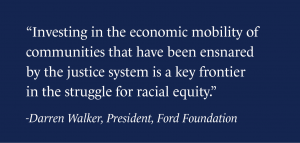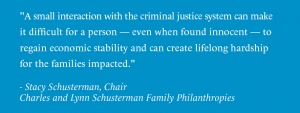Opening doors to opportunity for people, families, and communities touched by the justice system
Mass criminalization and incarceration are among the greatest civil rights challenges of our time; an estimated 77 million Americans have criminal records, and millions more engage with the system each year. It’s also a giant contributor to intergenerational poverty: once in the system, the damage to an individual’s economic chances is often disastrous due to barriers they face in getting an education, maintaining stable housing, and connecting to employment opportunities and public benefits. This cycle of injustice is particularly devastating for low-income people and people of color, with Black communities bearing a disproportionate burden of poverty and disenfranchisement.
At Blue Meridian, our investments focus on promoting upward economic mobility among people and communities trapped in poverty. In the criminal justice arena, we had the opportunity to join our pooled capital and performance-based investing expertise with the social justice leadership of the Ford Foundation, with added support from the Charles and Lynn Schusterman Family Philanthropies. With a $250 million initial investment, we’ve together launched the Justice and Mobility collaboration to invest in solutions that boost economic mobility and strengthen the life trajectories of people impacted by the criminal justice system. (Read more about this work in The Washington Post.)

Each Justice and Mobility co-sponsor brings expertise and perspectives to the work that sharpen the strategy and strengthen the outcomes for justice-involved people. “Investing in the economic mobility of communities that have been ensnared by the justice system is a key frontier in the struggle for racial equity,” says Darren Walker, president of the Ford Foundation. “When individuals are stable, whole communities are stabilized. The Justice and Mobility Fund’s unique collaboration and contribution expands access to jobs, education, and other opportunities that will help break the cycle of poverty and injustice in under-resourced Black and brown communities.”
“If we want to achieve racial and economic justice in this country, we must address mass criminalization and its disproportionate impact on Black people and communities of color. A small interaction with the criminal justice system can make it difficult for a person – even when found innocent – to regain economic stability and can create lifelong hardship for the families impacted,” notes Stacy Schusterman, chair, Charles and Lynn Schusterman Family Philanthropies. “The Justice and Mobility Fund is an opportunity to join forces with other funders to increase our impact on a deeply entrenched issue that has been historically underfunded. We hope more partners will consider joining this important work.”
We’re working to equip social sector leaders with the long-term, flexible support they need to dream big in advancing reforms that help people build their futures without being held back by their past. In so doing, we have a powerful opportunity to pursue a more just America – where all people are empowered to reach their full potential.
Scaling reforms that promote economic mobility
The human and economic costs of America’s unjust approach to justice are well-documented, and leaders across government, business, and the social sector are taking significant strides toward reform. Our Justice and Mobility work looks to amplify those efforts and fill critical gaps as we make large, long-term, unrestricted investments in an arena traditionally dominated by short-term, project-specific funding. We know there is no single solution that will make the progress we seek; therefore, Justice and Mobility investments support complementary solutions that span direct service provision, policy advocacy, changing narratives about criminal justice and economic mobility, and building the evidence base for what works.

This spring we reached $145 million in investments to an extraordinary set of leaders and their organizations that are advancing scalable solutions to ensure stronger futures for people, families, and entire communities impacted by the system. This total also encompassed emergency relief for individuals re-entering their communities after being released from prison or jail during the COVID-19 pandemic.
Working nationwide and in specific states with low levels of economic mobility, extensive rates of incarceration and racial disparities, and readiness for reform, Justice and Mobility investees are innovating at key points across the spectrum of criminal justice engagement. They’re diverting people from the system before they are booked for offenses; connecting returnees to public benefits, employment, and other resources; and reducing and mitigating harms tied to convictions and incarceration at points in between.
Through their efforts, these investees are securing wins that are making a difference for millions: for instance, the Clean Slate Initiative worked with partners to enact legislation in Michigan and Connecticut that paves the way for nearly 1.5 million people to have eligible criminal records expunged, thus removing major barriers to employment and affordable housing. The Center for Employment Opportunities deployed its existing pay card platform in 28 cities, together with 32 community partners, to supply urgent cash assistance to more than 10,000 individuals released from jail or prison during the pandemic, helping them regain their footing and prepare for finding jobs. And, recognizing that education is a potent equalizer of opportunity, the Vera Institute of Justice – together with partner organizations and formerly incarcerated students who shared their stories – prevailed in appealing to Congress to lift the 26-year-old ban on Pell Grants for incarcerated students, who now qualify for federal grant money to pursue postsecondary education.
The path ahead
There are exciting developments on deck this year for our Justice and Mobility work. We’re rolling out an ambitious employment strategy that aims to prepare justice-involved people to find and grow in steady jobs, revamp policies and dismantle systems that discourage fair chance hiring, and make it mainstream practice for employers to hire people held back by past records. One in three American adults has a criminal record; if we can normalize the hiring of this long-disenfranchised segment of the workforce, we have tremendous potential to propel the long-term success of people with past records and expand businesses’ talent pool.
As is the case across our investments, we continue to center our Justice and Mobility efforts around building racial equity – from narrowing disparities, to investing in leadership teams of color, to helping amplify the voices of justice-involved people in all our efforts. We are optimistic that our work to expand employment pathways for justice-involved people can create greater racial equity in the workforce.
Ultimately, we know we cannot pursue upward economic mobility for individuals and families without eliminating the devastating barriers imposed by mass criminalization and incarceration. Through our Justice and Mobility work, in concert with many other reform efforts, we believe that we can help realize a system of justice in America that, rather than sentencing people to lifetimes of poverty, connects them with avenues of opportunity that lead to safer, stronger, and more equitable futures.
Investee Spotlight
Clean Slate Initiative
Managing Director Sheena Meade
Clean Slate Initiative advances policies to automatically clear eligible criminal records, with the goal of increasing economic and social opportunity for millions of Americans.
Alliance for Safety and Justice
Founder & President Lenore Anderson
Alliance for Safety and Justice partners with state leaders and advocates to reform systems and replace over-incarceration with safety solutions rooted in prevention, rehabilitation, and support.
Vera Institute of Justice
President & Director Nicholas Turner
The Vera Institute of Justice works to create antiracist justice systems and develop ideas, research, and analysis to fight mass incarceration and end racial disparities.
Michigan Justice Fund
President & CEO Melanca Clark
Hosted by the Community Foundation for Southeast Michigan, the Michigan Justice Fund makes investments to advance the prosperity of residents by promoting community-driven alternatives to incarceration and providing support to people after release from jail or prison.